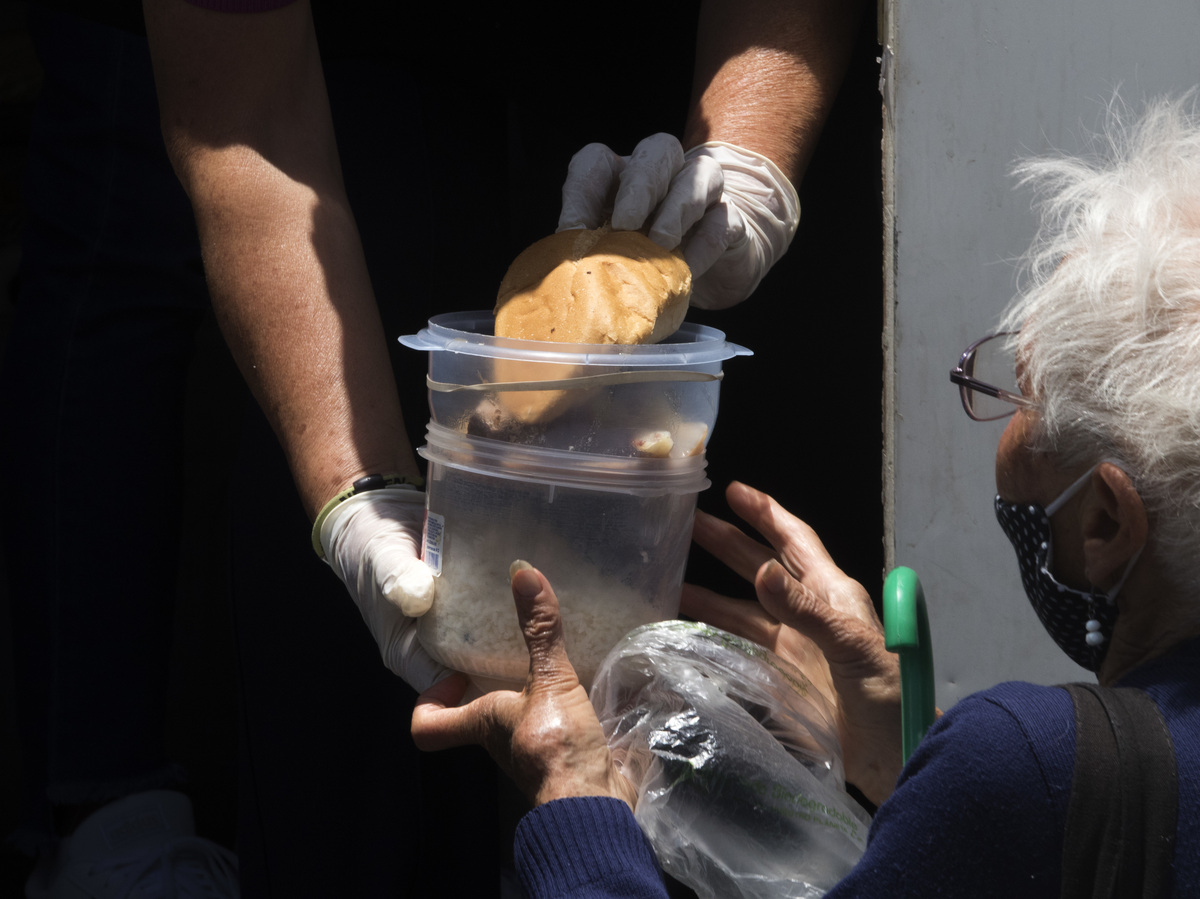‘If Coronavirus Doesn’t Kill Me, Hunger Will’: Mexico’s Poor Bear Brunt Of Pandemic

Enlarge this image
Relatives of victims who died from COVID-19 visit graves in the special area of the Municipal Pantheon of Valle de Chalco, Mexico. The coronavirus has taken a heavy toll on the country, especially its poorest citizens.
Alfredo Estrella/AFP via Getty Images
hide caption
toggle caption
Alfredo Estrella/AFP via Getty Images

Enlarge this image
People line up for food from a soup kitchen in Mexico City. The city’s welfare agency has scrambled to deal with growing demand as the pandemic deepens Mexico’s recession.
James Fredrick for NPR
hide caption
toggle caption
James Fredrick for NPR

Enlarge this image
People line up to receive food at a food truck outside La Raza National Medical Center in Azcapotzalco, Mexico City, on June 12.
Claudio Cruz/AFP via Getty Images
hide caption
toggle caption
Claudio Cruz/AFP via Getty Images

Coronavirus Live Updates
A Mexican ‘Lucha Libre’ Wrestler Is Sewing Masks To Fight Coronavirus
«Many millions of people have lost their jobs … and the government hasn’t given really any support to firms or workers at all,» says Valeria Moy, the director of the Mexican Institute for Competitiveness, a pro-business think tank in Mexico City.
An estimated 12.5 million Mexicans lost their job and left the job market entirely in April, when coronavirus restrictions came into effect, according to analysis of official data.
According to an estimate from BBVA Bancomer Bank, it will take Mexico a full decade to recover the economic losses underway without major fiscal stimulus.
The López Obrador administration has offered 25,000 peso ($1,250) business loans but Moy says they won’t make a dent in the slump. The government also advanced pension payments to the elderly but has so far rejected any new cash transfers to support struggling Mexicans.
«[López Obrador] has a very deep aversion to debt. He hates debt. One of his main campaign promises was to decrease the debt. He is very stubborn in saying we will not incur more debt,» says Moy.
It’s a difficult position to square for a president who often uses the phrase «primero lo pobres,» which means putting «the poor first.»
«What worries me most is that the government doesn’t seem willing to respond to the gravity of this crisis,» says Rolando Cordera Campos, an economist from UNAM. «Those who earn little, who live day to day, which is a lot of people in Mexico, are the most immediately and directly affected by lockdowns.»

Latin America
As Mexico’s Dominant Cartel Gains Power, The President Vows ‘Hugs, Not Bullets’
A government agency that tracks poverty and social programs estimates that more than 10 million Mexicans could fall into extreme poverty because of the economic effects of the coronavirus. That would wipe out more than a decade of poverty reduction.
«There’s no reason people should be going hungry in Mexico,» Cordera says. «We can afford to spend this money.»

Enlarge this image
An elderly woman receives a food ration at a food truck installed outside La Raza National Medical Center in Azcapotzalco, Mexico City, on June 12.
Claudio Cruz/AFP via Getty Images
hide caption
toggle caption
Claudio Cruz/AFP via Getty Images
An elderly woman receives a food ration at a food truck installed outside La Raza National Medical Center in Azcapotzalco, Mexico City, on June 12.
Claudio Cruz/AFP via Getty Images
To keep people fed, Cordera and his university colleagues say the president needs to immediately send 75 billion pesos ($3.3 billion) in cash transfers to Mexicans struggling with food insecurity.
«Millions of people incurred the economic cost of staying at home, for the public good of stopping the spread of the virus,» says Cordera. «The government hasn’t taken the right steps to ensure they don’t suffer for this.»
In Mexico City at least, it’s too early to predict the long-term social impacts of the pandemic, says Ocejo Rojo of the local government. Over the next few months, the welfare agency will collect data and have a clearer picture. But the worry is palpable.
«My concern is that inequality is reinforced because of the pandemic, that people who are already vulnerable suffer greater hardship and end up being even more vulnerable because of this,» Ocejo Rojo says.
Gallegos says she has no choice but to keep working every day.
«I don’t receive any support from anyone,» she says. She shrugs off the lack of government aid, saying, politicians «are all the same: They say they’ll help and they never do.»
She’s doing what she can to avoid the virus. She says she wears a mask, keeps a distance from others and regularly disinfects or washes her hands.
«I hope the virus doesn’t find me, that I don’t catch it,» she says.
«But if it does, oh well. If I can’t be cured, I guess I’ll be going to another place.»
- Coronavirus in Mexico
- Coronavirus in Latin America
- coronavirus pandemic
- COVID-19
- Mexico














Комментарии 0